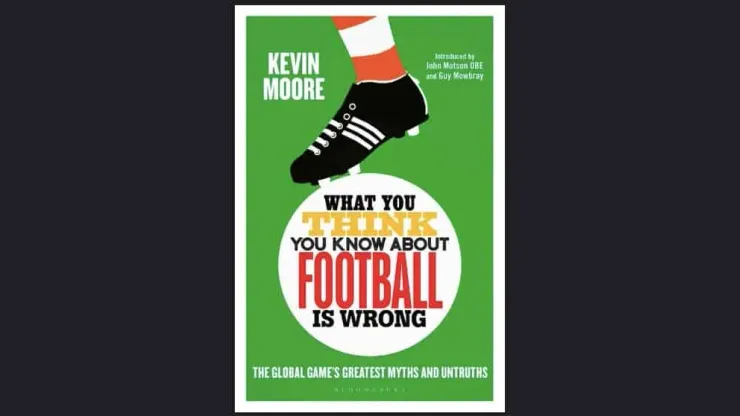All sports have their myths, and soccer is no different. Fans will passionately argue that England/Italy/Uruguay cheated to win the 1966/1934/1950 World Cup. Or that England/Italy/Germany/Scotland is the parent of modern soccer. The game thrives on myths especially when its margins are so thin; one goal scored is often enough to change the history of the game in ways not found in other sports.
Recently authors and scientists have used statistics and numerical methodology found in other sports to justify their positions. Soccernomics was a best seller twice using this new way of settling old debates. Dr. Kevin Moore takes a new approach. He addresses the debates with science and knowledge, but doesn’t show his work. The result is a delightful, entertaining and easy read that can add new elements to old soccer debates.
Dr. Moore’s bona fides to write a book about soccer controversies are inarguable, which allows him to write a book like this. He is the founding director of the National Football Museum, and spent 19 years as its director until stepping down in 2017. That position has given him access to the materials and experts on a wide range of soccer topics.
What You Think You Know About Football Is Wrong is a brief 240 pages, and covers about 50 myths of the soccer world. Moore flashes his knowledge early on when discussing the controversial third goal in the England-Germany match in 1966. He goes through what the still photographs, media recordings, and other recordings show to prove that the shot did cross the line. Why it is still controversial is because the limitation of technology at the time only permitted certain, rigid camera views that make the goal look short.
READ MORE: Top 20 soccer book recommendations
Each topic is only a few pages, and unlike Soccernomics, Moore doesn’t flash mathematical formulas, pictures, and proof of his arguments. He just makes them and tells the reader why. It is effective because, again, he has the work background to be trustworthy and he states upfront the reasons for his arguments. Rugby could have been what soccer is today if in the early years of both sports certain amateurism had not been sacrosanct to rugby’s organizers. Dynamo Kiev players were not executed by the Stasi in 1941 after defeating their team because the history of the players is known, and only a few were executed by the Nazis well after the match was played. Hooliganism was a problem in England, but not because fans’ lives were in danger. It was because most violence was decided prior to the match between the ultras (and Italy is just as bad if not worse).
The book lacks the depth and arguments of other “myth-busting” soccer books so some readers will be disappointed to see how brief and straight-forward this book is. I however rather enjoyed how easy of a read it was. It was a good change of pace to not have an author bend over backwards to justify a position. Dr. Moore’s style of making his argument and succinctly explaining why made for a quick, good read. While this is not one of my favorite books – and likely will not be yours – you’ll undoubtedly learn at least one or two fun facts and not dedicate a lot of time to it. If there could be a soccer book that’s a “beach read,” this is it.
‘What You Think You Know About Football Is Wrong’ is available via Amazon in hardcover, Kindle and Audible formats.
200+ Channels With Sports & News
- Starting price: $33/mo. for fubo Latino Package
- Watch Premier League, Women’s World Cup, Euro 2024 & Gold Cup
The New Home of MLS
- Price: $14.99/mo. for MLS Season Pass
- Watch every MLS game including playoffs & Leagues Cup
Many Sports & ESPN Originals
- Price: $10.99/mo. (or get ESPN+, Hulu & Disney+ for $14.99/mo.)
- Features Bundesliga, LaLiga, Championship, & FA Cup
2,000+ soccer games per year
- Price: $5.99/mo
- Features Champions League, Serie A, Europa League & Brasileirāo
175 Premier League Games & PL TV
- Starting price: $5.99/mo. for Peacock Premium
- Watch 175 exclusive EPL games per season






